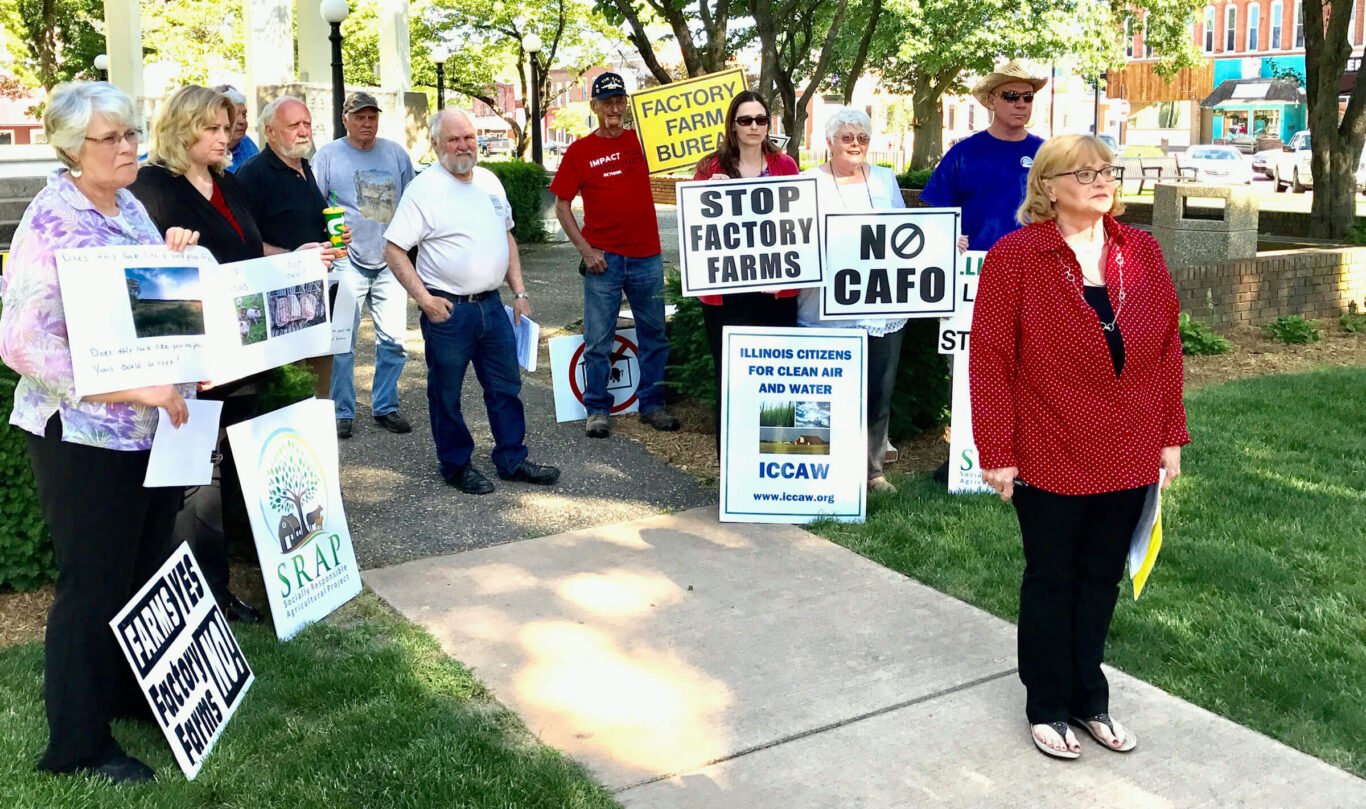Share
FOR IMMEDIATE RELEASE
Media Contact:
Danielle Diamond (815) 403-0278
danielled@sraproject.org
Karen Hudson (309) 308-8846
karenh@sraproject.org
August 2020
Community Coalition Pushes Illinois EPA to Control Industrial Livestock Pollution
Illinois—Due to the state’s weak regulation and enforcement of the robust and expanding livestock industry, concentrated animal feeding operations (CAFOs) are a leading cause of water pollution in Illinois, and stronger laws are desperately needed to protect surface waters. The Illinois Coalition for Clean Air and Water (ICCAW) and several partner groups submitted comments calling upon the Illinois Environmental Protection Agency (IEPA) to enact more stringent regulatory requirements last week.
The Clean Water Act’s National Pollutant Discharge Elimination System (NPDES) General Permit for Concentrated Animal Feeding Operations (CAFOs) renewal process allows the public to submit comments and address shortcomings of the IEPA’s draft permit.
Very few of the thousands of livestock facilities in Illinois have applied to operate under the water pollution control general permit. Currently, these facilities are not even required to register their operations and locations with the IEPA. This failure in oversight and lack of regulation through permitting controls leave the IEPA and the public in the dark regarding massive amounts of manure application, locations, facility ownership and more.
Because of Illinois’ hydrology and topography, nearly all livestock operators still land-apply waste in a climate with sloping, frozen, snow-covered, or saturated ground during several months of the year, causing runoff pollution to ground and surface water. Illinois also has been extensively tile-drained, which allows manure to easily contaminate surface waters. Nearly 120,000 stream miles and over 300,000 lake acres, public and private water supplies, as well as quality of life are impacted. CAFOs have been identified as one of the leading causes of fish-kills in the state.
“Unlike other states, IEPA does not employ its authority needed to properly regulate CAFOs,” said Danielle Diamond of ICCAW and the Socially Responsible Agriculture Project (SRAP). “All livestock facilities should be required to register with the agency, and all CAFOs should have to apply for NPDES or equivalent state pollution control operating permits.”
The coalition also has requested a public hearing on the Draft CAFO General Permit. Some of the revisions being sought include: greater manure application setbacks from residences and water sources; ground and surface water quality monitoring around CAFOs, submittal of manure management plans that are transparent to the public and a provision for livestock waste runoff onto others’ land or nuisance odors impacting neighboring properties as de facto violations of the permit.
The statewide coalition stresses that changes are required immediately for the IEPA to finally assert proper regulatory oversight over the industrial livestock industry in Illinois. Otherwise, the state could lose its federally delegated authority to administer the Clean Water Act—not only for CAFOs, but all regulated industries.
“ICCAW and partner groups have worked long and hard for change,” Diamond said. “This public comment period is a part of that effort. Illinois has won the race to the bottom in terms of regulating pollution from CAFOs. We must change this scenario.”
For More Information, see link to IEPA’s proposed CAFO NPDES General Permit, at https://external.epa.illinois.gov/WebSiteApi/api/PublicNotices/GetDocument/11606; see also organizations below and also Illinois Environmental Council’s Lunch and Learn Series, CLE Presentation on “Illinois Livestock Facility Laws and Lack Thereof,” available at: https://ilenviro.org/livestock-operations-2/, Aug. 13, 2020.
Illinois Coalition for Clean Air & Water
www.iccaw.org
Karen Hudson
karenh@sraproject.org
Socially Responsible Agriculture Project
Danielle Diamond
danielled@sraproject.org
Lynn Henning
lynnh@sraproject.org
Trout Unlimited
https://obtu.org/
Edward L. Michael / Govt. Affairs Chair
michaeled223@comcast.net
Illinois Environmental Council
https://ilenviro.org/
Eliot Clay / Agriculture and Water Programs Director
eclay@ilenviro.org
Concerns Farmers & Citizens of Marshall County
Sharon DeWeerth
Sdeweerth@gmail.com
H.O.M.E.S. Helping Others Maintain Environmental Standards
Jo Daviees County
https://www.stopthemegadairy.org/
Citizens Against Factory Hog Farms
Winnebago County
Dennis Johnson
dennisjohnson.jqs@gmail.com
RRRA Rural Residents for Responsible Agriculture
Ramona Cook
rciik@mtcnow.net

